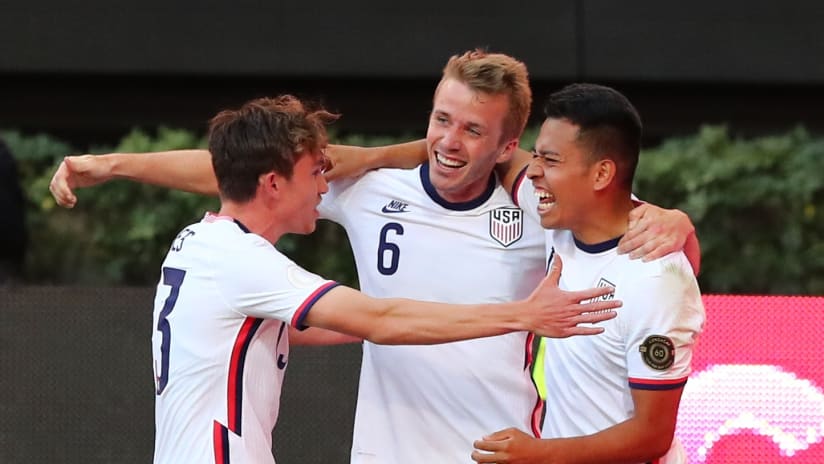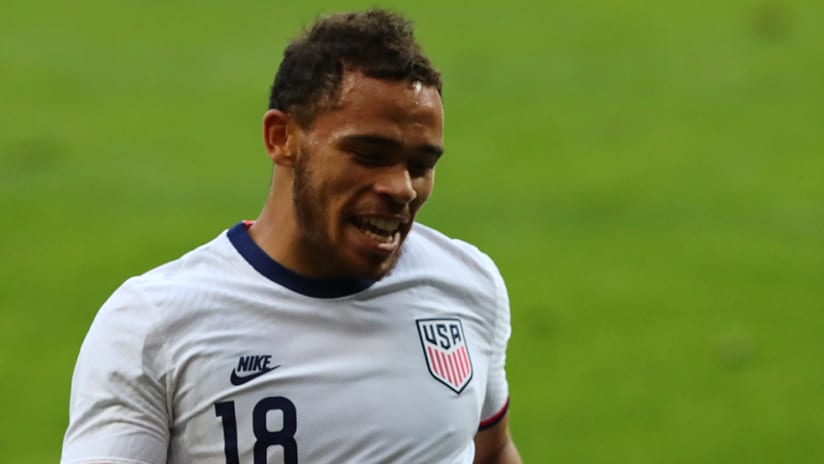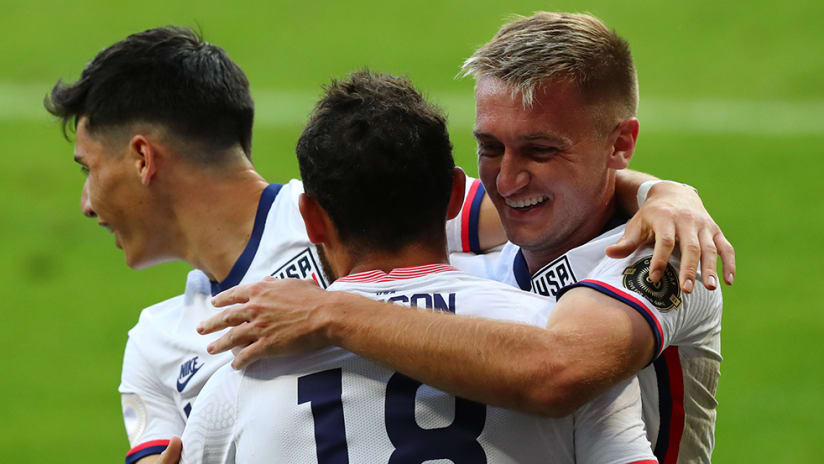Two matches, two wins, and on course for the all-important semifinals.
In terms of outcomes, the US Under-23 men’s national team is checking all the boxes they need to thus far at the Concacaf Olympic qualifying tournament.
Sunday’s 4-0 win over the Dominican Republic takes them to six points from six in Guadalajara, and with the knockout stages in sight they can step up to the usual intensity of a United States-Mexico match with clear hearts and calm nerves when they meet their El Tri counterparts in their final group-stage match on Wednesday.
Now, in terms of performance? That’s a more nuanced story, as the young Yanks were hardly dominant until a young, well-drilled DR side tired in the game’s late stages. Let’s start there.
Polishing the stone
I use the term “grinding” to describe this US outing, which carries some negative connotations – we all want to see flowing, slick soccer with no sand in the gears, right? But in some cases a power sander can get a job done, especially when you’re a regional giant seeking to assert your dominance against minnows and upstarts.
Coach Jason Kreis said postgame that the DR threw the US a curve with their 3-4-2-1 formation, “a completely different shape than we've seen them play ever before,” and the Caribbean side’s discipline and intensity staved off Goliath for an hour, long enough to get some nerves twitching before
Jackson Yueill’s instinctive flicked finish broke the ice.
“I felt our guys were just a little bit too cautious about the affair. I think our guys were more concerned about the transition than they were about creating attacking moments,” said Kreis. “Those two things add up to not a great performance in the first half. But what we saw in the second half was much improved and we're pleased to walk out with another three points.”
Yueill doesn’t usually roam that far forward from defensive midfield. Turns out he was actually not the No. 6 in this one, with Kreis explaining that Andres Perea was assigned the single-pivot with Yueill and Johnny Cardoso the 8s, and end result aside, not everyone seemed completely comfortable. To the coach it “looked a little different just because of the qualities of the players,” and I’ll agree with that.
Was this a muddle of assignments and tendencies, or a team finding its way, step by step, to solve problems in a tournament environment? Well, some players are certainly finding their feet…
Stock up, stock down
No prizes for guessing Sunday’s big winner: Hassani Dotson, whose entry in the 62nd in place of Cardoso coincided with the United States’ assertion of control and culminated with his two expertly-taken goals. The Minnesota United utility man also played a role in the game-winner vs. Costa Rica; he’s showing that he’s here for much more than his versatility and should be a first-choice starter from here on.
Djordje Mihailovic subbed in at the same time and looked a lot more dangerous working from wide positions than he had as a center mid in the first game. Kreis will now have to consider whether the CF Montréal man might be more useful off the bench, with tired defenders and generally more space to exploit.
Elsewhere, right back Julian Araujo wasn’t as clean on the ball as he usually is and might have missed a chance to push ahead of Aaron Herrera for the starting role, while Henry Kessler showed himself to be a solid center back option, with little to no drop-off from Mauricio Pineda. Whether it was his lack of impact or his teammates’ failure to understand and reward his movement, Jesus Ferreira saw little of the ball and seems likely to be rotated in favor of Sebastian Soto vs. Mexico.
The funny thing about all this is that Wednesday’s XI may not at all reflect the above. Though he maintained that the US fully plan to win that game, Kreis has every reason to marshal his resources in order to be at full bore for the next game after that – the must-win semifinal against a TBA foe from Group B. And if not only qualifying, but also winning this tournament outright is a top goal as he’s said previously, they may well meet El Tri again in the final.
In praise of the stragglers
The DR are staring at a last-place finish in Group A, but that’s hardly the real story. Debutants in this event, with its youngest roster, Los Quisqueyanos were impressive given the gulf between them and the US. Inter Miami homegrown Edison Azcona and his mates showed no fear and executed their game plan effectively, even if their legs and minds let them down in the final half-hour.
MLS and USL scouts should take notice of what’s happening with Dominican soccer. Mexican manager Jacques Passy is an old Concacaf hand who is overseeing a promising renewal of the program with limited resources; on Sunday he left the U-23s in charge of his assistant Jonathan Himelfarb in order to jet off to prepare the senior squad for their upcoming World Cup qualifiers.
“We played 60 minutes that I believe were very good, which were at the level of the game, which is a challenge by itself for us,” said Himelfarb postgame. “If you look at our lineup, we have six players that are 20 years or younger and this has become, because of the pandemic and whatever an under-24 tournament, so maybe it's the lack of experience, maybe we are a little bit out of rhythm. Mentally I think we can do better, but yeah about the effort and the first 60 minutes I'm really proud, and definitely the future is bright for the Dominican Republic football association.”
There will be more talents like Azcona rising through the ranks, both at home and among the large populations of Dominican-Americans in the States. Many of their youngsters are finding opportunities in Spain’s lower divisions, and hopefully some savvy US or Canadian clubs will go digging for diamonds, too.













